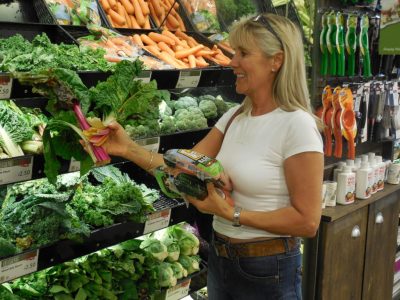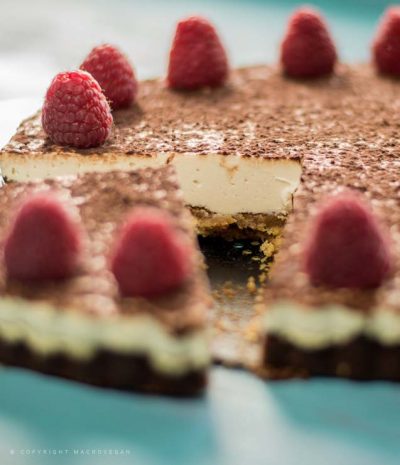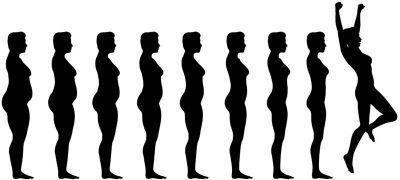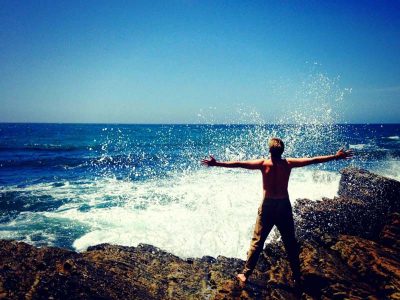On-Line Nutrition Course

MACROVegan Nutrition Course
Food, Health and Human Ecology
MACROVegan Online Nutrition Course is a unique and in-depth exploration of modern day nutrition from international teacher, author and health counsellor Bill Tara. If you are looking for a certificate program to add to your professional skills as a Nutritional Health Coach or simply wish to deepen your understanding of the confusion that surrounds nutrition, this course will fill your needs. The course examines our food choices and shows how they impact not only our personal health but social and environmental health as well.
A short introduction to our on line course - Please view this short introductory video that will give you an insight into the personal story from Bill Tara that led him to teaching thousands of students world-wide during the past 50 years.
In this second short video here Bill will share with you the content and outline of what you will study.
My part in the course will have you all cooking up dishes in your kitchen like a professional chef. First and foremost, what we feed our bodies reflect on our day to day health and wellbeing. A naturally balanced diet is like healthy soil. When our bodies are properly nourished, the quality of our blood is sound, and the cells function in a normal way. In the KITCHEN with Marlene is where health and healing begins. The 60 recipes within the course are split into six categories.
10 Soups
10 Grains & Beans
10 Pasta/Noodles/Lighter Bowls
10 Vegetables & Sea Vegetables
10 Sauces, Dressings & Dips
10 Desserts
We look forward to working with many of you world-wide. To share our passion towards creating a healthy world for all humans and non-humans alike has been our mission and vision for decades. For immediate download you can purchase the course here from our MACROVegan Shop
There is no time-frame for completion of the course. Take as long as you like, we are here to guide and inspire you. Certification is available on completion of all the modules. We connect with all our students on our facebook discussion board page daily to answer questions and upload new material.
In good health
Reading Food Labels To Avoid Toxic Ingredients

Reading Food Labels To Avoid Toxic Ingredients
When you go shopping, your first stop should be at the colourful aisle that is stocked with wonderful seasonal fruits and vegetables.
In this produce section, choose a wide variety of fresh fruit and vegetables – these are naturally low in fat, sodium and rich in cholesterol-lowering fibre. You can also choose frozen fruits and vegetables to have as a stand-by when there are times that you simply need something quick. If you buy ‘simple’ frozen vegetables without any sauces, they can be better choices than cans because they eliminate salt and that’s a must to control blood pressure and manage heart disease. When purchasing canned goods choose brands with no-added-salt.
Following a MACROVegan lifestyle means avoiding all animal foods to limit the amount of saturated fat, that’s the fat that comes from animals and hardens our organs. Be very careful to avoid trans fats, check the labels if it says partially hydrogenated or hydrogenated it contains trans fats. Trans fats can be found naturally at low levels in some foods, such as those from animals, including meat and dairy products. Artificial Trans fats can be formed when oil goes through a process called hydrogenation, which hardens the oil.
This type of fat, known as hydrogenated fat, can be used for frying or as an ingredient in processed foods. Much smaller amounts of artificial trans fats can also be made when oils are refined to make them fit to eat. Artificial Trans fats can be found in some processed foods such as biscuits and cakes where they are sometimes used to help give products a longer shelf life. Please also be aware of using products with Palm Oil. The industry is linked to major issues such as deforestation, habitat degradation, climate change, animal cruelty and indigenous rights abuses in the countries where it is produced, as the land and forests must be cleared for the development of the oil palm plantations.
Focus on plant-based protein like all sorts of beans and lentils, tofu, tempeh, seitan. These foods are fantastic sources of soluble fibre, not only to keep your digestive tract working well but also to combat cholesterol!
The colourful bins with an array of wholegrain such as short grain brown rice, wild rice, millet, quinoa, in golden and in red, buckwheat, and so much more are the mainstay of our diet. They provide us with long-lasting energy every day and don’t mess with our blood sugar, so make sure to stock up on these amazing grains.
For breakfast use wholegrain porridge or oatmeal which are excellent choices but if you are a cereal lover look for ones that have wholegrain and fibre with no sugar or make your own. When you start to read labels you will be surprised at what is actually in all those beautifully packaged ‘healthy’ breakfast cereals. There is only one brand of cornflakes that we can find that is sweetened with barley malt. Incredible eh!
There are many delicious breakfast recipe ideas on our MACROVegan you tube channel and in my book ‘Macrobiotics for all Seasons’ available world wide on amazon or as a download with my delicious Cooklets on our MACROVegan Shop.
In good health
Marlene's 60th Vegan Birthday Cake

Marlene's 60th Vegan Birthday Cake
Black & White Chocolate Cake
I created this recipe for my mum's 90th birthday cake. Everyone loved it, so much so, it has now become the family's birthday cake. Unfortunately, I had to make my own.!!!
The crunchy base texture contrasts with the creamy top, to make this sumptuous cake irresistible
Oat or Quinoa Nut Crust
1 cup oat or quinoa flour
2 cups pecans
¼ cup brown rice syrup
1 tbsp. coconut oil
2 tbsp. maple or coconut sugar
3 tbsp. ground flax
½ tsp. ground cinnamon
½ tsp. sea salt
Preheat the oven to 175/350°. Put 2 cups pecans in a food processor and process until they start to clump and oils start to release. In a small saucepan melt the coconut oil with brown rice syrup, stirring all the time. Transfer the pecan mixture into a large bowl and mix with the rest of the ingredients. Using your hands, squeeze the dough over and over to combine. You should be able to form a ball with it. If it's too dry add a little water. Transfer the pecan dough into a 9” push-up fluted flan dish and smooth out evenly. Press down firmly with fingers, bringing it up along the sides pressing as firmly as you can. Prick the dough with a fork to make a cross. Bake for 9-12 minutes. Remove from the oven and allow to cool.
For the Cake Topping:
½ cup cacao butter
1½ cups cashew nuts, soaked overnight
1 cup almond milk
½ cup maple syrup or rice syrup
1 tbsp. vanilla extract
2 tbsp. lemon juice
Cacao powder for dusting
Drain the cashews and rinse in cold water. Melt the cocoa butter in a small saucepan, on a low heat. Pour into your blender. Add all the other ingredients and whizz until smooth. Pour over the cooled cake base. Sprinkle with cacao powder and place in the refrigerator. Once set, decorate with raspberries.
MACROVegan ChitChat
Cashews are used throughout the world, as paste base for curries in India and Sri Lanka, as whole nuts in Thailand and China, and brewed as sweeteners in Spanish and South American desserts. Add them to chocolates and cakes. Please ensure you purchase fair-trade organic cashews grown using sustainable farming practices such as biodiversity and multi-cropping.
In good health
Non Styling
Dyslexia friendly
Dyslexia friendly
Large version
Standard layout
Thriving On A MACROVegan Diet

When we reflect deeply on our relationship with the outer world, our environment, we realise that we are never independent of its influences. Our vision with MACROVegan is to continue to share our passion for a vegan world. Our Human Ecology Diet is abundant in every vitamin and mineral required for good health, vitality and longevity.
Utilising intentional living by embracing a MACROVegan way of life. We have no need for any animal flesh or dairy food to live a full long life with vibrant health. We receive all the nutrients we need from a wholefood plant based diet.
How to Rethink Protein Once and For All
When you think of the biggest animals on the planet, elephants, giraffes, buffalo, these huge mammals, they don’t eat meat, so where do they get their protein? They eat what grows out of the ground and that is where they get their protein; it’s as simple as that. There are many foods in the plant kingdom that are especially rich in protein. All the legume family, anything that is grown in a pod, lentils, beans, chickpeas, wholegrains are full of protein, and lots of vegetables are rich in protein.
Protein is in everything: Vegan athletes are renowned for their athletic excellence.
If you are getting enough calories based on wholefoods, I am not talking about processed sugary foods, I am talking about wholefoods as they grow out of the ground – if you eat this way, wholegrains, beans, legumes, vegetables, seeds, nuts, fruits, you will obtain your requirement of protein easily and in a healthful way because the protein is in the bean, in the lentil, in the wholegrain.
Protein deficiency is not an issue on a vegan diet, people simply use this as an excuse if they are not doing well…. I hear it so often……I am not getting enough protein. That’s not the problem, there are plenty of amino acids, plenty of protein on a plant based diet. In fact, the health crisis exists because people are eating way too much protein, which in fact injure your arteries, injure your kidneys as it leaches calcium out of your bones.
Eating a plant based or vegan diet does not mean living on processed foods, sweets or soft drinks. You must eat FOOD AS GROWN to receive the adequate protein you need daily. Corn on the cob is one thing, corn chips are different, potatoes are a wholefood, and potato crisps are not. In our decades of health counselling, we have yet to meet someone with a protein deficiency Only those starving to death are deficient in protein. If you are going to be adopting a wholefoods plant based diet, there are some things you must do properly. It’s not just a matter of eating snack foods or processed fake ‘meats’ and burgers, and think you are going to be healthy.
Another myth is that B12 is not vegan. Vitamin B12 is made by micro-organisms, and isn't produced by plants. Fortified foods and supplements are the only proven reliable sources for vegans: Fortified foods: Vitamin B12 is added to some alternatives to milk products, vegan spreads, nutritional yeast flakes, yeast extracts and breakfast cereals.
Please follow our MACROVegan dietary guidelines here:
Nutrient Sources in Whole Foods:
Complex Carbohydrates
Whole Grains, Beans, Vegetables, Fruits
Proteins
Beans, Seeds, Nuts, Whole Grains, Seaweeds
Fat
Seeds, Nuts, Oils, Beans, Tofu, Tempeh, Oats
Calcium
Dark Greens (Kale, Collards, etc.), Soybeans, Seaweeds, Seeds
Iron
Dark Greens, Seaweeds, Millet, Lentils, Garbanzo Beans, Seeds
Vitamin A
Dark Leafy Greens, Carrots, Squashes, Seaweeds
B Vitamins
Whole Grains, Sea Vegetables, Lentils, Fermented Foods
Vitamin B12
Fortified Foods, Nutritional Yeast etc., B12 supplementation
Vitamin C
Dark Greens (Kale, Parsley, Broccoli, etc.), Local Fruits
Vitamin E
Whole Grains, Unrefined Oils, Seeds, Leafy Greens
Trace Minerals
Sea Salt, Seaweeds, Organic Produce
In good health
Become A Health Coach with MACROVegan

Become A Health Coach with MACROVegan
MACROVegan Philosophy & Lifestyle
The topic of nutrition has become a bewildering landscape of cultural myth and vested interest. There is an urgent need for a new approach to human diet, one that cuts through the commercial PR, the political caution and the nutritional confusion.
The MACROVegan approach to eating addresses these concerns with a fusion of two important doctrines. The first of these are the ecological insights of ancient Asian health care found in macrobiotic studies. This tradition points to the benefits of seasonal, regional and ecologically sustainable nutrition.
The second set of standards come from the ethic of the modern vegan approach to eating that drives the leading edge of contemporary nutritional science proven by both medical study and extensive epidemiological research.
The MACROVegan way of eating addresses the requirements for vibrant health as well as a delicious, diverse and socially responsible way of eating.
This philosophy offers a unique approach to self-transformation. MACROVegan practice improves our energy, stamina and flexibility as well as our mental well-being and creativity. It also enhances intuitive instinctual and intellectual abilities and opens us up to greater levels of spiritual growth.
Food - Food has a very powerful influence on our physical, mental, emotional and spiritual well-being. For many of us, trying to work out what constitutes a healthy diet can be confusing. This is where a MACROVegan approach can help. Macrobiotics considers the energetic quality of food and uses the polarity of expansion and contraction – yin and yang, to create balance. The vegan approach has no animals for use in any areas of our lives.
Wholegrains are the staple food of the MACROVegan diet, which also includes a wide variety of vegetables and complementary foods such as legumes, vegetables, sea vegetables, fermented vegetables, miso, nuts, seeds, fruits and a variety of condiments.
Ideally, the foods are organic, fresh, seasonal and locally grown. The unique art of macrobiotic and vegan cooking is in creating delicious meals adapted to individual needs.
Healthy Living – Is it Still Possible?
Modern living means that for many of us it is increasingly challenging to stay healthy. The good news is that it is possible. While problems such as environmental pollution, stress and the decreasing quality of food will not disappear overnight, there are still many positive choices we can make. After all, how we choose to live is our responsibility. The most important decisions we make are those which enhance our wellbeing on every level. Each day we choose to eat food that creates health or creates disease. A MACROVegan diet is a way forward for vitality and longevity.
Happiness is the endless realisation of one’s infinite dream. George Ohsawa
Life is really very simple: What you give you, you get back. Bill Tara & Marlene Watson-Tara
We look forward to welcoming you to the South of England to study with us.
In good health





